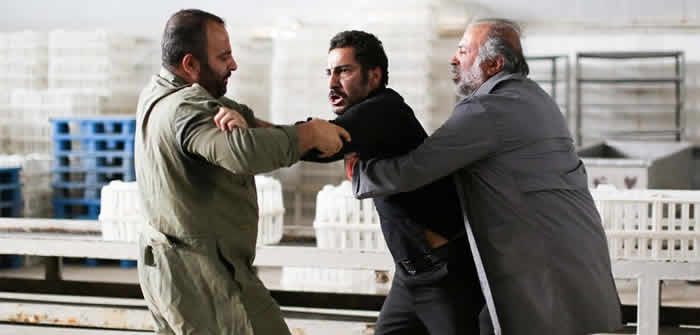Iranian cinema continues to draw large audiences at festivals, and Vahid Jalilvand’s second feature ‘No Date, No Signature’ (‘Bedoune Tarikh, Bedoune Emza’) was much applauded at its Venice Horizons bow. In the tradition of Asghar Farhadi’s ‘A Separation,’ its story zeroes in on the class conflict between the rich and the poor and plays, less than convincingly, on the guilt feelings of a powerful forensic pathologist who is involved in an accident that may or may not have caused a child’s death. Lensed with great sensitivity and style and superbly acted, it has one drawback for Western audiences in its perplexing plot points based on the local culture and customs.
Leading a well-directed, top-drawer cast is Amir Agha’ee as Dr. Kaveh Nariman, a driven senior forensic pathologist who is rigorous and unsparing of himself in his work. One night he drives off the hospital premises and knocks down a motorcycle on the highway. Aboard are a young man, his wife, his 8-year-old son Amir Ali and a baby. Miraculously, no one seems seriously hurt and the man, Musa (Navid Mohammadzadeh), hurries off into the night, ignoring the good doctor’s advice to stop by an ER room and check out his son’s bruised neck and arm.
A few days later, Amir Ali’s body is brought into the autopsy room. Understandably shocked, Dr. Nariman admits to knowing the boy and his father slightly. His nervousness raises the suspicions of the severe Dr. Sayeh Behbahani (star Hediyeh Tehrani in an icy professional turn) who rides to work with him every day. (The details of their relationship remain a mystery to non-Iranians, though they certainly seem much more than just colleagues.) In any event, she knows him well enough to sense he’s hiding something.
She performs the autopsy herself, and concludes that the boy died of botulism from eating rotten meat. Musa and his wife exchange a look: he bought cheap dead chickens earlier that week.
Mohammadzadeh, the versatile young actor who ended up swinging by the neck from a traffic light in I’m Not Angry!, dives into another hot-tempered role as the grief-stricken father. Mad with grief, his wife bitterly blames him for their son’s death in a heart-wrenching argument. His furious visit to the chicken factory and confrontation with the man who sold him the rotten birds turns into one of the film’s most dramatic and effective scenes, but it lands him in prison.
(Video interview is from the Venice Film Festival site and is in Farsi and Italian)
It would be better for Musa’s case if the cause of his son’s death were food poisoning, thus offering him extenuating circumstances for beating up the chicken seller. Instead Dr. Nariman is so tormented by his conscience that he has Amir Ali’s body exhumed and personally performs a second autopsy to see if the motorcycle accident or botulism was the “primary” cause of death. An academic question if ever there was one. Again, it may be a matter of cultural perspective, but his guilty conscience and overwhelming feeling of responsibility for the traffic accident seem like issues best dealt with in therapy, not a law court. In the meantime, he irresponsibly continues to drive without car insurance while talking on his cell phone.
An important subtext is the question of blood money that someone convicted of murder or manslaughter must pay to the victim’s family, but this will go over the heads of international audiences.
The film is a visual pleasure to watch, shot in elegant, nearly black and white images highlighted with faint traces of color. Mohsen Nassrollahi’s sets and costumes are effective in creating characters and setting the stage for the unfolding drama, matched by Peyman Yazdanian’s subtle musical comment.
Production company: Mehr Taha Studio
Cast: Navid Mohammadzadeh, Amir Agha’ee, Hediyeh Tehrani, Zakiyeh Behbahani, Sa’eed Dakh, Alireza Ostadi
Director: Vahid Jalilvand
Screenwriters: Ali Zarnegar, Vahid Jalilvand
Producers: Ali Jalilvand, Ehsan Alikhani
Director of photography: Peyman Shadmanfar
Production and costume designer: Mohsen Nassrollahi
Editor: Vahid Jalilvand, Sepehr Vakili
Music: Peyman Yazdanian
World sales: Noori Pictures
Venue: Venice Film Festival (Horizons)
104 minutes
Written by Deborah Young for Hollywood Reporter

